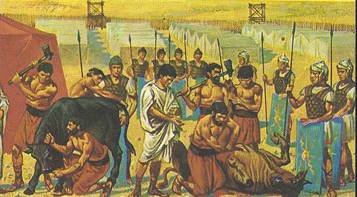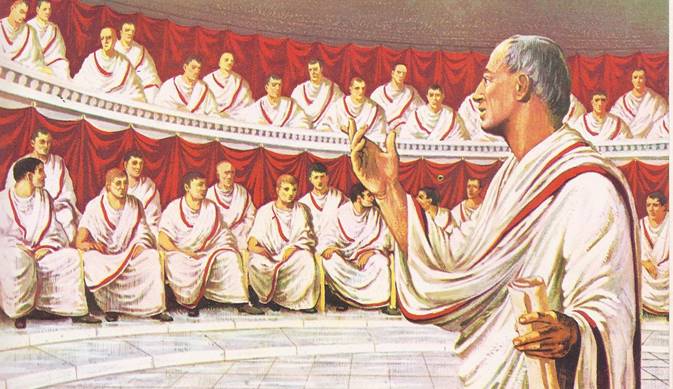IN 29 B.C. the gates of war were closed. Rome was at peace. Senators and the people of the mob-men who had hated and fought each other through long, bitter years — stood side by side in the Forum while the great doors of the temple of Janus were slowly pushed shut. That had happened only twice before in the history of the city. The crowd in the Forum cheered the peace and they cheered Octavius, their new ruler. He was no longer the young man who had rushed to Rome after the murder of his uncle, Caesar. Seventeen years had passed since then — seventeen years of hard campaigning, of friends who became enemies and of alliances that were broken. He was still handsome and his sharp eyes could still look through a man. He walked with a new dignity that won him the respect of the people and Senate alike. Wherever he went, cheering crowds followed him. His friends told him that he could make himself the king of Rome. Octavius remembered what had happened when Caesar had thought of becoming a king. Caesar had proved that one man with an army could do what the bickering Senate and the mob could not do: he could run the empire. A world with millions of people in it was still like the smallest Roman family; it worked best with only one pater familiar. Octavius meant to be that all powerful father of Rome, but he intended to let the Romans think that they had asked him to be it. He celebrated his Triumph with processions that went on for three days. With the treasures he had won in Egypt, he bought land to give to his soldiers. He ordered the building of a splendid temple to Apollo, as he …
Read More »The City Divided 130 B. C. – 70 B. C.
MARCUS TULLIUS CICERO, a young statesman known for his dramatic speeches, stood before a panel of judges in a courtroom in Rome. He stared at them angrily. For fifty days he had travelled through Sicily, collecting facts about the crimes committed by Caius Verres, the man who was on trial. Now the judges had told him that there would not be time to listen to his evidence. Cicero knew that the judges had been bribed. For it was no ordinary criminal that he meant to send to prison or to death. Caius Verres was an aristocrat and a senator and had served for three years as the governor of the province of Sicily. Verres’ lawyer was Hortensius, the leader of the aristocrats. Indeed, every rich or important man in Rome seemed to be supporting Verres, but Cicero was determined that this man should not escape judgment. He turned to Hortensius and offered to present his case in one day. “Would the court have time enough for that?” ‘ he asked sarcastically. Hortensius was surprised, but he smiled and told Cicero to try it if he liked. The judges agreed. For a moment there was silence in the courtroom, as Cicero turned to face the benches where the long lines of judges sat. Sternly he looked from man to man until he was certain all their eyes were on him. Then he began to speak. He listed Verres’ crimes: When he was governor and the commander of Rome’s army in Sicily, he had taken for himself the money raised to pay the troops. When he was governor and responsible for order and justice in the province, he had taken more money to allow pirates to rob the ports, to set criminals free and to condemn innocent men. For gold, he had …
Read More »

